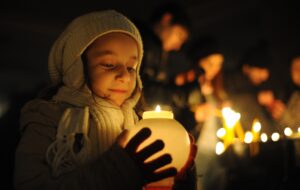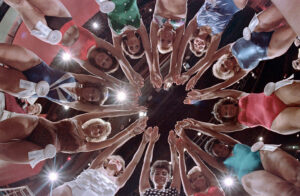Here’s a riddle: Since we live in an uncertain and unpredictable world, and humans have evolved to survive and thrive in it, why do we crave certainty? Wouldn’t we be more successful as a species if our default mode were to assume that everything was uncertain, and that we need to be constantly vigilant to anticipate the next thing we’ll have to deal with?
Amid all the apocalyptic prophesying that has defined the dawn of 2024, this is the refreshing contention of Maggie Jackson’s call for us to embrace the unknown. Rather than focus on “aleatory uncertainty”, with its emphasis on how random the universe can be, Jackson’s Uncertain: The Wisdom and Wonder of Being Unsure is more concerned with “epistemic uncertainty”, where the starting point of our pursuit of knowledge is the not knowing. The problem, she notes, is that this powerful drive makes us more keen to have any answer than to have the right answer.
Not only that: we like our experts to deliver the right answer quickly and with reassuring fluency, so we can relax and let them get on with life-saving surgery or cracking enemy codes, or whatever. And yet, we don’t like them to be so intuitive that they mess up when something surprising happens. When, say, the economy unexpectedly tanks or the shuttle blows up, we want to know why they didn’t consider other possibilities. And so Jackson says we need our experts to have both elements: the fluency that comes from training, practice and experience, as well as the alertness to the unexpected and a constant ability to switch from automaticity to “a readiness to work with the unknown”.
How might this be achieved? One answer is provided by psychologists and brain scientists who have spent years studying teams in high-pressure situations, from climbing Everest to reaching a jury decision in a rape trial. They have reached useful conclusions about using uncertainty to reach better decisions, instead of fleeing the discomfort of doubt. “Groups that cultivate judicious conflict, dissent, and mutual criticism tend to be high-performing,” says Jackson.
Elsewhere, psychologists such as Celeste Kidd have highlighted how childhood experiences influence a person’s willingness to embrace uncertainty. Revisiting the Marshmallow Test that explores a child’s ability to defer gratification (leave the first marshmallow uneaten, and get two marshmallows later), Kidd concluded that “for a child accustomed to stolen possessions and broken promises, the only guaranteed treats are the ones you already have swallowed”. Her work, and that of others, showed that children who grow up in chaotic and unpredictable environments learn to take nothing for granted, and pick up quickly on changes and threats. Their quickness to change focus, and slowness to trust, is normally seen as a weakness, but it can be an advantage in precarious situations. Uncertainty, after all, usually breeds scepticism.
Yet this doesn’t mean that those with more contented childhoods necessarily feel more secure or see the future as predictable. The realities of life will often put paid to that. This coming year, for instance, will no doubt be defined by war, economic tribulation and political upheaval — with each outburst will come a reminder of the very real uncertainties of human nature. In almost every country, there is also a disquieting sense that nobody competent or trustworthy has the situation under control. There is no Nasa CapCom to take charge of a crisis or steer the spacecraft safely home.
Worse still, we lack not only a trustworthy skipper with a competent crew, but a chart and compass by which they might steer. Visions of the future have always been contested, but today even that contestation seems chaotic and unpredictable. Emotive causes that draw heavily on the justifications of identity groups attract fervent support, while old centres of authority founder in doubt about what values, causes or boundaries they ought to advance, or even defend. As Yeats wrote more than a century ago: “The best lack all conviction, while the worst / Are full of passionate intensity.”
This is the more difficult aspect of uncertainty that now burdens us. In a time of polarisation, of dismissing not just the opinions but the humanity of those with whom we disagree, can uncertainty open up some common ground? Here, Jackson defends tolerance, and free speech, especially for opposing opinions. “Tolerance is the chance to create with another an evolving understanding,” she says. “It is a mutual promise to keep learning.” And, crucially, this includes acknowledging the rights of other humans to hold opinions and adhere to values that one finds odious. Otherwise, like upholding freedom of speech only for speech that we find acceptable, it becomes meaningless. The problem arises when tolerance becomes relativism, when we embrace uncertainty so completely that no values or principles are worth defending. How, for instance, can we argue that the Taliban are wrong to exclude girls from school if we lack principles upon which to build the case that girls have an equal right to education?
This lack of certainty about society’s underlying values imbues all levels of social life with a sense of precarity. Of course, those foundational values have changed through history, sometimes convulsively. The idea of universal equality among human beings would, for instance, have been nonsensical to most of our ancestors. Economies heavily reliant on chattel slavery collided violently with the enlightenment values expressed in the French revolution’s motto of Liberté, Égalité, Fraternité. Public argument about society’s deepest values was essential to changing them practically as well as theoretically.
This, as we enter a new year, is the deeper question that underlies our troubled relationship with uncertainty: about what should we be certain, and how can we justify that certainty to ourselves as well as others? After all, without tolerance, we cannot test ideas against each other, or retain the basic sense that a person’s humanity is valuable, however strongly we reject their ideas. But without commitment to core values — such as a universal human claim to humanity — we have no defence against the worst ideas except to say that we don’t like how they make us feel.
Can we ever be sure that our ideas are the best ideas? Not completely. We can test them against the best opposing arguments, but at some point there is a leap of faith involved in putting them into action. But some ideas are better than others, and worth fighting for. Of that we should be certain.
Disclaimer
Some of the posts we share are controversial and we do not necessarily agree with them in the whole extend. Sometimes we agree with the content or part of it but we do not agree with the narration or language. Nevertheless we find them somehow interesting, valuable and/or informative or we share them, because we strongly believe in freedom of speech, free press and journalism. We strongly encourage you to have a critical approach to all the content, do your own research and analysis to build your own opinion.
We would be glad to have your feedback.
Source: UnHerd Read the original article here: https://unherd.com/




